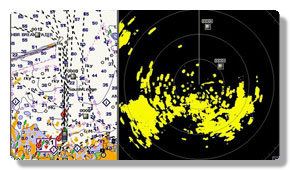Navigating At Night
An article from Captain Kent Dresser
Navigating at night can be an enjoyable part of your recreational boating experience. It can also be a very dangerous part if not approached properly.
Night navigation requires skill and concentration and should not be taken lightly. Many things change on the water after daylight. While on your boat at night, your depth perception decreases and distances and sizes of shores and navigational aids can look different. Waves become harder to see and judge and reflections in your boat's windshield can be confusing.
Your night vision can be drastically reduced by bridge and city lights as well as lighted buoys that are close aboard. All of these factors should be taken into consideration when navigating your vessel at night.
Before navigating at night for the first time, it is a good idea to take someone with you that has night navigation experience. You should always ensure that all of your electronics are working properly and invest in a high quality spotlight. Remember that landmarks and navigational aids are going to look different at night and you will need your spotlight to double check buoy colors and numbers while underway. Always make sure that all of your running lights are operating and are not blocked from another mariner's view by flags or other obstructions attached to your vessel.
When using your spotlight, you should take whatever steps you can to prevent from shining your spotlight into the wheelhouse of other boats. You can easily ruin another boater's night vision with your spotlight. Be prepared to look away from other vessel's spotlights should that skipper shine his light into your wheelhouse. Only turn your spotlight on for the amount of time you need it to light what you are looking at. Never leave your spotlight on continuously while underway as it can distract boaters that are a fair distance away. If you feel the necessity to leave your spotlight on at all times, you may want to reconsider taking your boat out at night.
When using your electronics, it is a good idea to turn down the brilliancy of their backlights. Your eyes will not have to adjust as drastically between looking at the waters ahead of you and looking at your electronics if you keep them as dim as possible. Also, remember, that after a few hours of looking at a radar or GPS screen, you can very easily become fatigued and develop a headache. Don't hesitate to take a break and let someone else steer occasionally to help cut down on fatigue.
Unless you are involved in an emergency, there is no reason to navigate at full speed in the darkness. Don't hesitate to back off the throttles and give yourself more time to react at night. Keep a very sharp lookout for lobster pots and unlit buoys as well. Both of these objects can appear much smaller at night and can be much easier to hit.
When navigating in the vicinity of other boats in the dark, remember that it is possible that the other boater does not see, or is confused by, your running lights. Watch nearby boats closely to ensure that they are not on a collision course with you. If a nearby boat does look to be on a collision course, make a dramatic course change if possible and try to make yourself more visible. Turning your spotlight on without shining it directly on a nearby boater more often than not attracts just enough attention to alert the other boater to your presence. Remember, try not to destroy the other boater's night vision.
Use extra diligence in ensuring that your passengers and crew do not fall overboard at night. Locating a person in the water at night is very difficult and your chances of recovering that person are very slim. Keep less experienced passengers seated and don't let anyone wander onto open decks alone or unnecessarily. Always wear your life jackets and insist that everyone on-board your boat does as well. Imagine throwing a coconut overboard while cruising at night, then turning around and trying to find the coconut. How well you can see that coconut is a good representation of how well you would see a person floating with their head just above water.
All of these factors should be kept in mind when approaching night navigation. Remember that night navigation requires considerable focus and concentration and should not be taken lightly. Learning to navigate your boat safely at night can add a whole world of enjoyment to your boating career. Failure to learn proper night navigation techniques, however, can quickly land you in the middle of a very bad situation.

